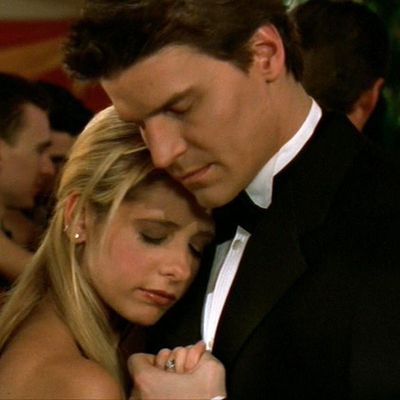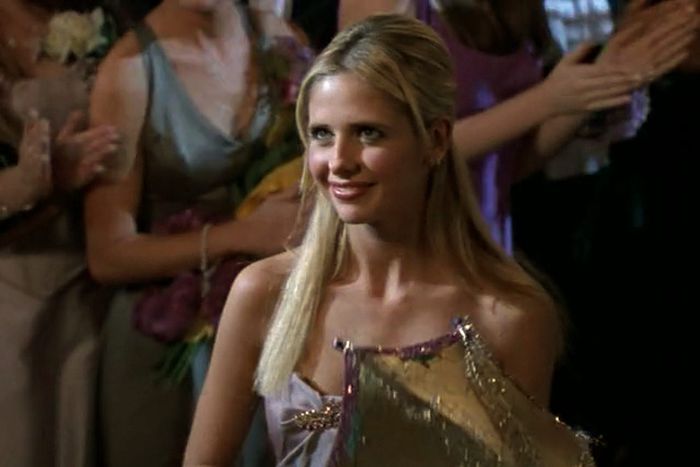
When you’ve watched your boyfriend turn homicidal ly evil, spent a summer in hiding under an assumed name, and literally died (albeit briefly), attending your high-school prom might not seem like a priority. But when you’re Buffy Summers, the Chosen One, the search for a normal teenage experience is sometimes just as important as thwarting the umpteenth apocalypse.
It’s been 20 years since Buffy the Vampire Slayer’s hero slow-danced with her vampire soul mate Angel at an “end-of-high-school rite of passage thingy,” as Buffy herself puts it. “The Prom,” which aired May 11, 1999, was the penultimate episode of the show’s third season — just before the two-part finale, “Graduation Day” — and a bittersweet reminder that the series was moving on from its original mission statement. The episode marked the end of an era, with Buffy and her friends beginning their long good-bye to high school, and Angel leaving Buffy (and, shortly thereafter, the show as a whole for his own spinoff). But it was also the height of the delicate balancing act the series had mastered: a “monster of the week” story in which the monsters play second fiddle to the grounded teen drama of high school.
The first three seasons of Buffy literalized the sentiment that high school is hell: “The Pack” turned hormonal teens into hyenas, “Surprise/Innocence” was a cautionary tale of losing your virginity to the wrong guy, and “Phases” dramatized the awkward changes of adolescence via lycanthropy. “The Prom,” however, is less about a metaphor and more about what the central event means to Buffy. For a 17-year-old girl who has spent the vast majority of her stint in high school battling the forces of evil, it’s a rare opportunity to put on a pretty dress and not think about vampires for a night. Sometimes, even for the Slayer, a prom is just a prom. That’s actually the whole point.
When people reflect on those early seasons, they usually praise the “high school is hell” ethos, but what’s often overlooked is how important the “high school” part is to that equation. The show succeeded thanks to its blend of tone and genre — horror, drama, comedy — making it a teen show with monsters, and treating both sides with respect and care. Buffy resonated with audiences, particularly young people, not only because it got the demons right but also because it got high school right. Going through a major breakup or not being able to attend the prom isn’t the end of the world, particularly when you’ve faced real extinction, but that doesn’t mean it doesn’t feel that way.
The brilliance of “The Prom” in particular is the way it sidelines the supernatural in favor of the relatively mundane, something the show previously explored in episodes like the forgettable “Never Kill a Boy on the First Date” — which at least gave us the iconic line “If the apocalypse comes, beep me” — and the far more successful (and tongue-in-cheek) “The Zeppo.” In “The Prom,” Buffy’s insistence on the normal prom experience is the driving force of the episode, not to mention a source of frustration for her Watcher Giles, who has no time for a discussion of dress options, and Angel, who reminds her, “We have more important things to think about than a dance.” Those “things” include the hellhounds, the central component of a revenge plot by an outcast named Tucker, as well as the larger lurking threat of the Mayor’s Ascension. But Buffy counters Angel with a comeback that underlines the episode’s theme: “Isn’t this the stuff that I’m supposed to get invested in — going to a formal, graduating, growing up?” Really, it’s the central conflict of the show’s high-school years as a whole.
“The Prom” is just one of many episodes to tackle the clash between Buffy’s world-saving responsibilities and her longing for a normal teenage life. But there’s a reason this episode specifically is so beloved. Sarah Michelle Gellar called it her personal favorite in a 2014 Reddit AMA: “I just love that whole story,” she wrote, “and I thought it just encapsulated the show so well. It was beautiful and heartbreaking.” Danny Strong, who played Sunnydale High’s most notable nerd, Jonathan, told Vulture that fans still regularly approach him about the episode. “There’s something about it that really stuck with people,” he said. “The Prom” is the purest articulation of the themes at the heart of Buffy’s high-school years because it homes in on the teen drama with such precision. The episode pivots the show to She’s All That territory, where there is nothing more important than a school dance. Hellmouth, be damned, Buffy insists: “I’m gonna give you all a nice, fun, normal evening if I have to kill every single person on the face of the Earth to do it.”
It’s not just the dance, of course — the episode spends a fair amount of its runtime on Buffy and Angel’s breakup. This wasn’t the first time the couple had parted ways: He previously turned into his soulless alter ego, Angelus, and tried to end the world, so she had to kill him and send him to Hell. That’s part of what makes the familiar heartbreak in “The Prom” all the more relevant. This time, they’re splitting up for reasons far more commonplace than to prevent the end of the world — they’re in different places and want different things — but the show treats this breakup with the same weight. How telling that Buffy describes her heartache as something fatal. “I’m just trying to keep from dying,” she tells her best friend, Willow, through sobs. “I can’t breathe, Will. I feel like I can’t breathe.”
Thankfully, “The Prom” follows standard teen-movie trajectory and gives Buffy something at least close to a happy ending, providing closure for the characters but also for the fans before that daunting transition from high school to college and the more adult problems that come with it. Buffy dispatches the hellhounds with ease, allowing her friends to have the prom they deserve. And while she doesn’t win Prom Queen, she gets an even more meaningful award: In a moving speech, Jonathan reveals that Buffy’s classmates know (at least on some level) that she’s responsible for their survival, bestowing on her a (spray-painted) gold umbrella that says, “Buffy Summers, Class Protector.” It’s a stunning moment, followed immediately by Angel’s surprise arrival at the prom. While the Sundays’ somber cover of “Wild Horses” plays, Buffy and her recent ex share one last perfect slow dance.
The gut punch of “The Prom” is a testament to the show’s ability to make you care about moments big and small. Strong, who has since found success as a writer, director, and producer for Hollywood projects ranging from Empire to The Hunger Games, believes Buffy had a tremendous effect on contemporary TV writers, himself included. “You hear about it over the years, of TV writers being very inspired and influenced by Buffy, so it wouldn’t surprise me at all if some of these shows today — Sabrina, Riverdale — are influenced by it,” he said. “It certainly would give a road map to showing that if you portray [teenagers] with an emotional reality, you get much richer storytelling.”
It all comes down to stakes. On a show like Buffy, where the fate of humanity regularly hangs in the balance, it would be easy to brush off the normal-life stuff. But by allowing its characters complex emotional lives and rich interiority, the series made the supernatural drama that much more compelling. It’s a lot easier to worry about the latest demon onslaught when you care about the would-be victims. Modern teen shows feel distinctly inspired by Buffy’s (no pun intended) stake-raising, and by the refusal to dismiss fights, crushes, and breakups as petty. Pretty Little Liars and Veronica Mars had their characters solving increasingly convoluted mysteries. Chilling Adventures of Sabrina sees its hero standing up to Satan himself. And Riverdale — well, let’s just say serial killers, bear attacks, and mass nun suicides have all figured into the plots. And yet none of these shows ever let the audience forget that these are teenagers with everyday teenage concerns. One day Archie is recovering from a mauling; the next, he’s stressing about the SATs.
It might sound silly, but if anything, Buffy’s insistence on finding the balance between real-life teen drama and the heightened life-or-death stakes of genre storytelling has only become more resonant. In increasingly turbulent times, with high-school students subjected to the depressingly constant threat of gun violence and psychologically damaging active-shooter drills, there’s something powerful about showing just how important real normalcy is — not the “new normal” of life in 2019. Buffy’s high-school years were a metaphor for the angst of adolescence, a concept that existed long before the show, but in the 20 years since Sunnydale High’s graduation day, they have become a reminder that teens desperately want to be teens, no matter how scary the world has become. As Angel tells Buffy in “The Prom,” “You deserve something outside of demons and darkness.”
That may be a bleak way of looking at it, but the relationship between real-life high-school violence and Buffy is nothing new. Two episodes from the third season — “Earshot,” which was supposed to air two weeks before “The Prom,” and the second half of “Graduation Day” — were postponed for months in light of the Columbine High School massacre. And yet Buffy always allowed for hope, infusing even its darkest stretches with moments of humor and joy. For all the pain on display in “The Prom,” there is also love and the satisfaction of seeing Buffy, who had to sacrifice so much of her youth, recognized for all the work that she’s done. As she basks in the surprise at her Class Protector award, Giles admits that he underestimated high-schoolers, something the show itself never did. “I had no idea,” he says, “that children, en masse, could be gracious.”


